What We Learned at the 2023 Coaching for Change Conference
 Sometimes seeing an abandoned
hallway is scary…like if you are stuck in the middle of a horror
movie, for example.
Sometimes seeing an abandoned
hallway is scary…like if you are stuck in the middle of a horror
movie, for example.
Other times, it is a bad sign…like if you are throwing a big house party, it’s two hours after it was supposed to begin, and still nobody has showed up!
Still, though, at other times, it’s a sign of a success…like at the 2023 Coaching for Change Conference, where you could walk down any hallway during a session and not see anyone (because everyone was so involved in the great lessons being presented.)
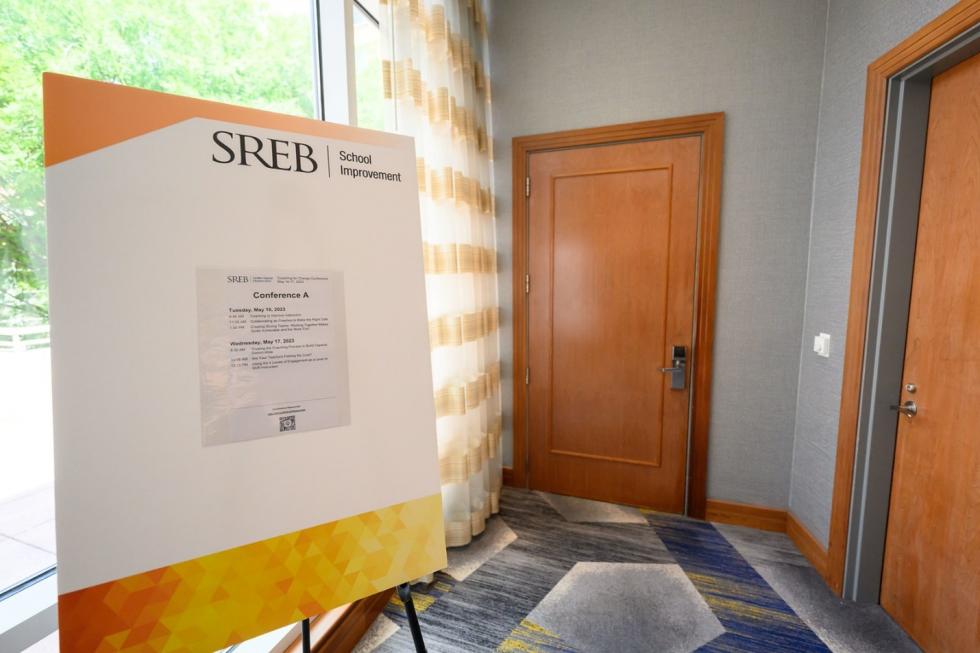 Rare as it is at a conference to
see this level of engagement, we are very happy to say we got it
this year. That’s because, along with great presenters, we had a
great group of attendees, all there to learn about coaching and
offer their own insights.
Rare as it is at a conference to
see this level of engagement, we are very happy to say we got it
this year. That’s because, along with great presenters, we had a
great group of attendees, all there to learn about coaching and
offer their own insights.
Beginning With the End
In the next few weeks, we are going to highlight some of the sessions we attended at this year’s Coaching for Change Conference, but I wanted to start by talking a little bit about the conference closing. While it may seem odd to start with the ending, in this case, I think it makes a lot of sense.
- The first part of the closing was the keynote address by Scott Warren, the Director of Making Schools Work at SREB, who offered coaching tips from AI, other coaches and himself.
- The second part was a conference reflection by Ivy Coburn, the Division Director of Education and Workforce at SREB.
Together, both sessions did a good job of highlighting ideas and takeaways that we hope you took away from your time at the conference. Thus, even though they closed the conference, they make a wonderful beginning to this series of posts!
Vitamins, Erosion and Other Tips from Scott Warren
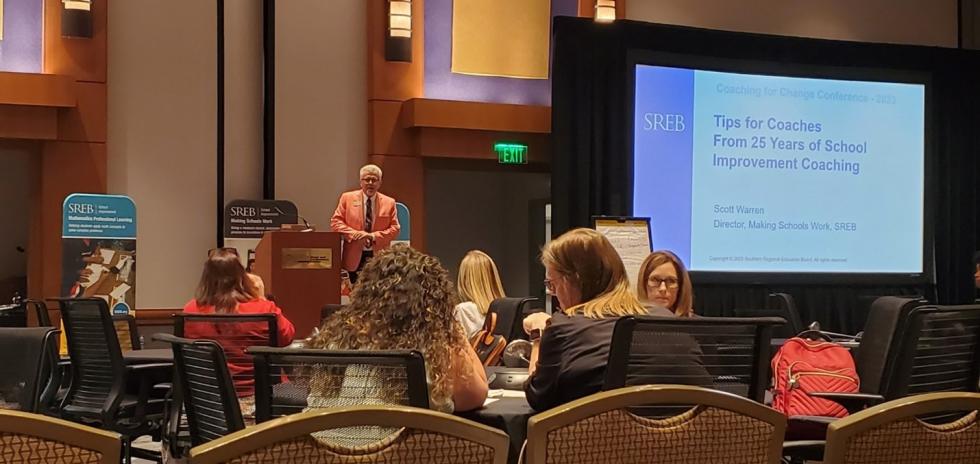 What’s the difference between ice
cream and advice?
What’s the difference between ice
cream and advice?
People ask for ice cream.
Well, I’m about to offer you some unasked for advice: You want to pay close attention to this part of the post. Scott has been a part of SREB for 23 years, following a career as a teacher, coach and school administrator for 20 years. He is retiring this year, so soak in all of his advice while you still can!
In his closing address, Scott shared his coaching tips, along with tips from ChatGPT and other coaches at the conference.
Let’s look at some of the most quotable of these:
10 Tips from the Closing Address
- Be a vitamin, not a vaccine: A vaccine is something you take once, and possibly add on a booster now and then. A vitamin is something you take every day. When it comes to coaching, you may not be able to actually meet face-to-face each day, but the presence of your strategies should still be felt all the time. It’s all about creating ongoing support in small chunks.
- Guide and support; Don’t just tell: When it comes to supporting your teachers, remember that you wouldn’t be there if they already knew how to do everything. Just like the students in your class, it isn’t enough to just say “Do X because I said so.” You should be there to help them see how and why to do the things you are coaching them to do.
- More is not better; Better is better: This tip came from Shelly Coburn, and it makes sense. Coaching isn’t about throwing the kitchen sink at your teachers and hoping something works. Don’t just give them something to do. Give them something to improve.
- Don’t let perfect be the enemy of better: Change is about improvement, not perfection. Sometimes, we wait too long to change things like new instructional strategies or new tool implementation because it isn’t perfect yet. However, if it is better than what you currently have, it’s an improvement!
-
Nobody washes their rental car–but they might wash
their own car: If you want to see change not only
happen but keep up even when you aren’t around, let people feel
ownership for the change. They’ll take care of it if they
do.
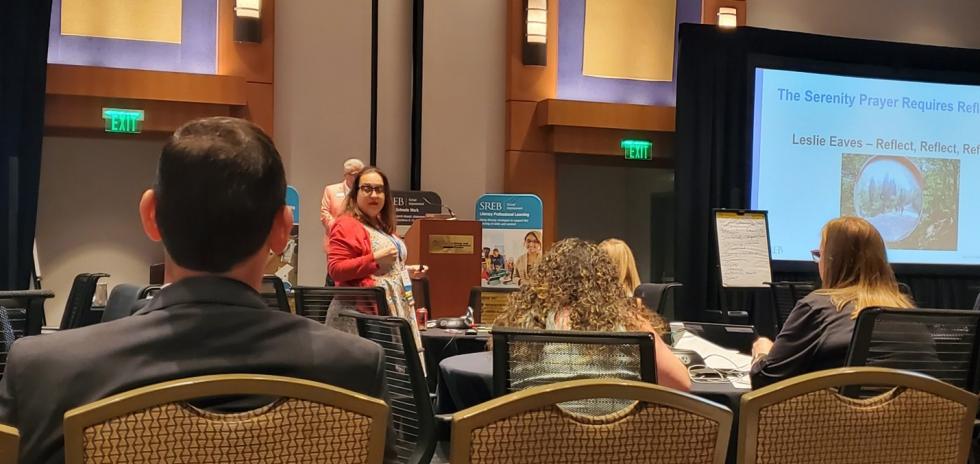
- Change is loss: Don’t forget it is hard for people to change. Help them through the grieving process instead of forcing them into it.
- Find your A-team: Teams have to gel. Everybody is right for a team, but not everyone is right for your team. Helping people find their best fit improves the process for everyone.
- Don’t forget to celebrate: All along the way, take time to celebrate the victories. People will want to keep up the celebration by reaching new milestones.
- Think erosion, not earthquake: Small pressure over time made the Grand Canyon. You don’t have to tear the whole place down to improve your school. Let small decisions make a big difference without overwhelming your teachers!
- Everyone wants to improve, but few want to change: People want to lose weight without exercise. They want to ace the test without studying. They want to improve their school without doing the work. It’s human nature. Helping them embrace the change, though, is how you get them to that improvement.
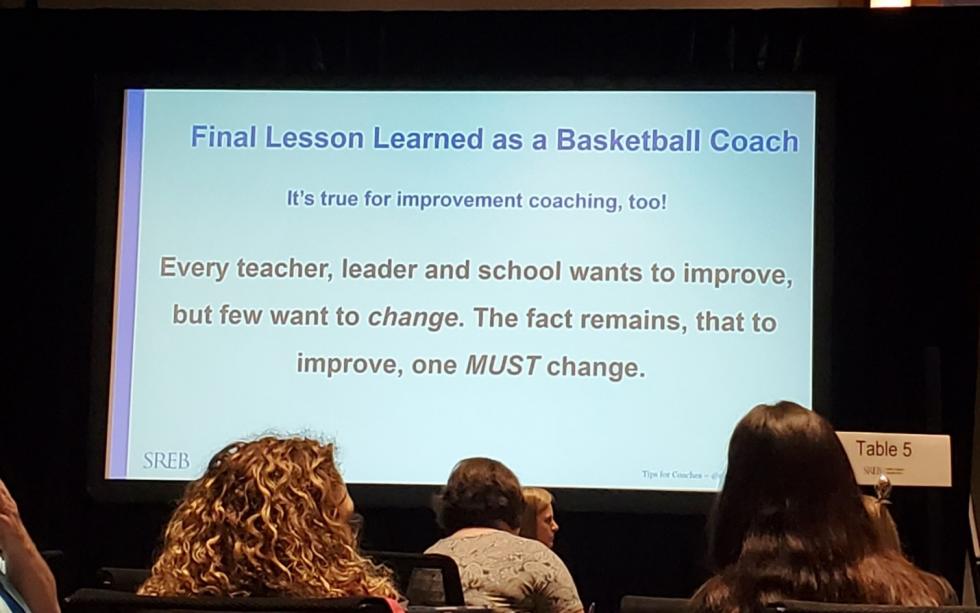 You can find the complete list of
Scott’s tips in his
conference slideshow.
You can find the complete list of
Scott’s tips in his
conference slideshow.
And Now a Word from Our Attendees: Reflections with Ivy Coburn
The grand finale of our coaching conference this year was a reflection hosted by Ivy Coburn. Along with information on completing a conference evaluation and getting certificates, Ivy’s session focused on what the attendees took away from the two-day event.
Using Menti to collect in-time results on some key take-aways, Ivy was able to get some insight into what everyone learned. The process was simple: Ivy asked a question, and the audience answered right on their phones.
So, I’ll break this down by question:
Three Essential Characteristics of a Coach
The first question asked participants to list the three words
that came to their mind when they heard “coach.” As people input
their words, it turned them into a word cloud, with the most
common words becoming bigger and bigger.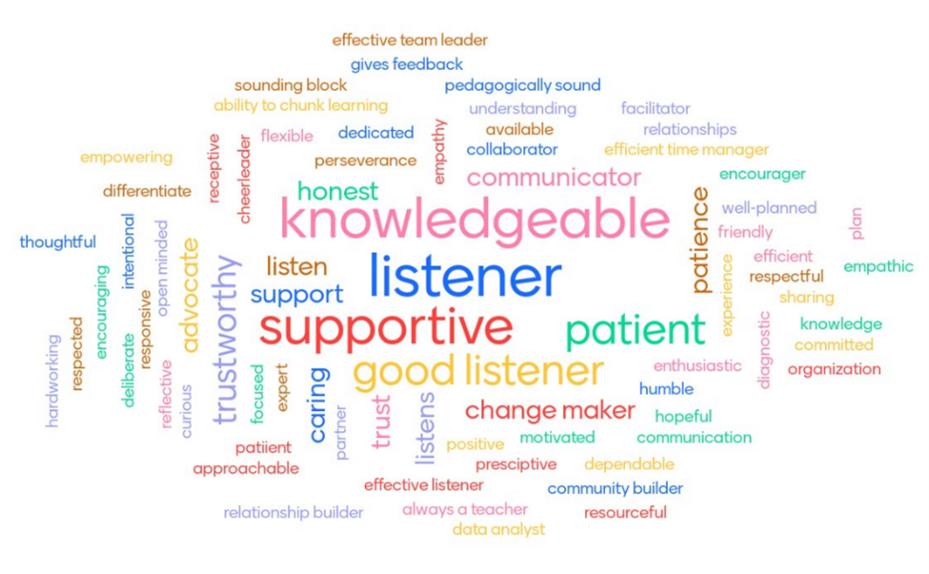
Some of the most noticeable words include:
- Knowledgeable
- Listener
- Supportive
- Patient
- Communicator
- Change maker
The MVP’s (Most Valuable Plays)
In the next question, participants were asked to rank their strengths. The most popular answers ranked 1-5 were:
- Plan for Success
- Strong Teams
- Trust the Process
- Sustain Change
- Turn Challenges
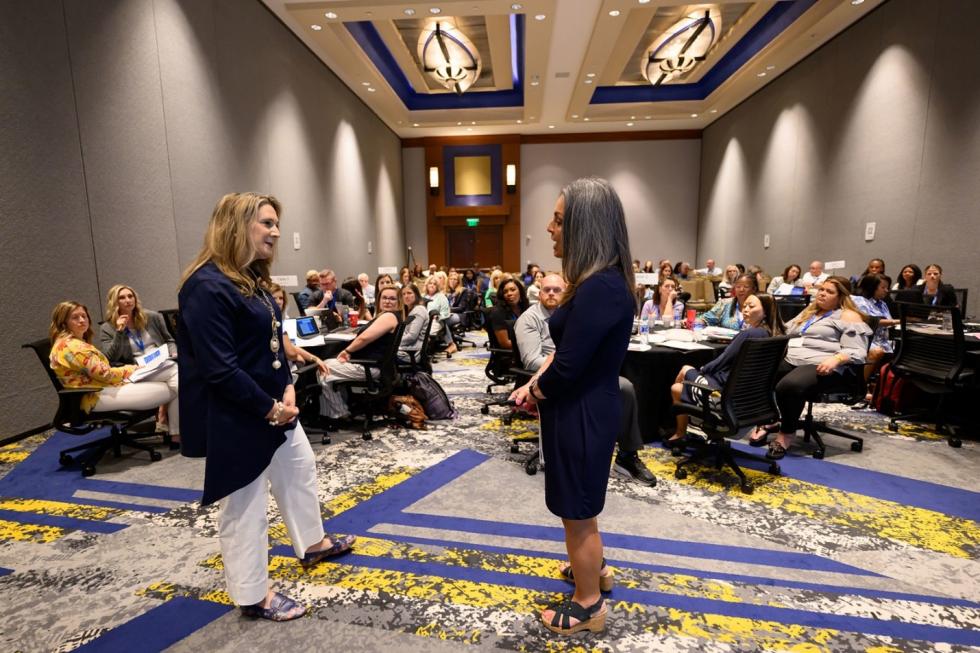 Following up, they were asked to
list the tools, resources or actions that helped them with these
plays. Here are some of the answers:
Following up, they were asked to
list the tools, resources or actions that helped them with these
plays. Here are some of the answers:
- School improvement cycle
- Collaborative planning time
- Developing professional learning
- Compelling scoreboards
- Listening
Sharing Is Caring
The next question asked attendees to list the ways they would share what they learned. Here are some of the responses:
- Blog
- Newsletter
- PLCs
- Modeling
- Summer academy
- PD for coaches
- Leadership meetings
- Re-delivery
- Google slides
- General conversations
The Future Is Near
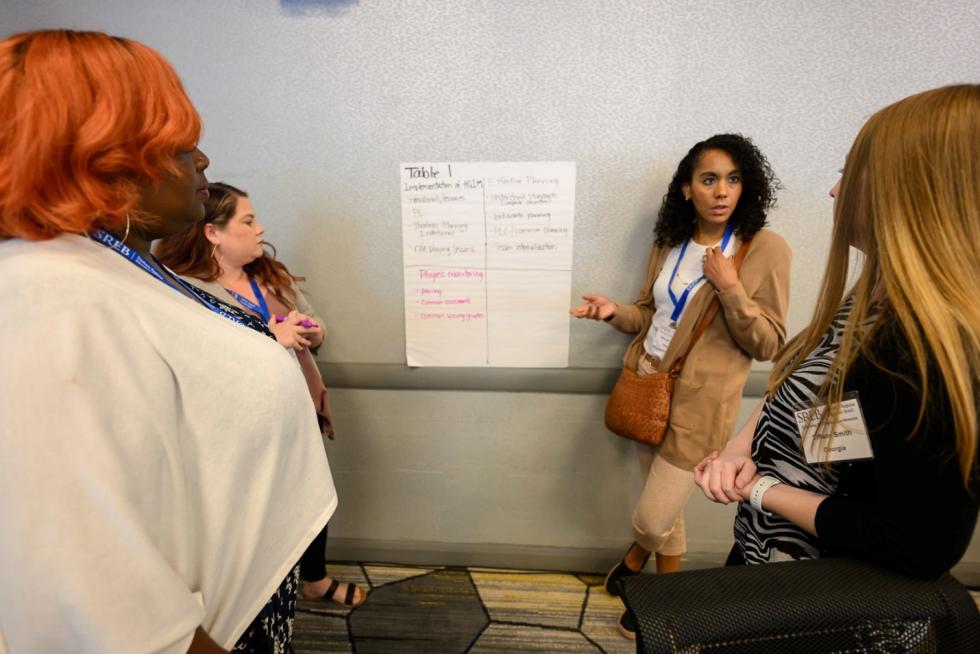 The final question asked people to
think about the future, specifically what they’d like to see at
the next Coaching for Change conference. Here are some of the
things they had to say:
The final question asked people to
think about the future, specifically what they’d like to see at
the next Coaching for Change conference. Here are some of the
things they had to say:
- More school team presentations
- More sessions on coaching moves
- Debrief examples
- Focus on literacy coaches
- More activities to practice after a presentation
- Q&A panel
- More table talks
- How to “sell” coaching to those who push back
- Coaching for equity
You can find the complete answers to each of the above questions in Ivy’s slideshow. Let us know anything you’d like to add to these answers!
Wrapping It Up
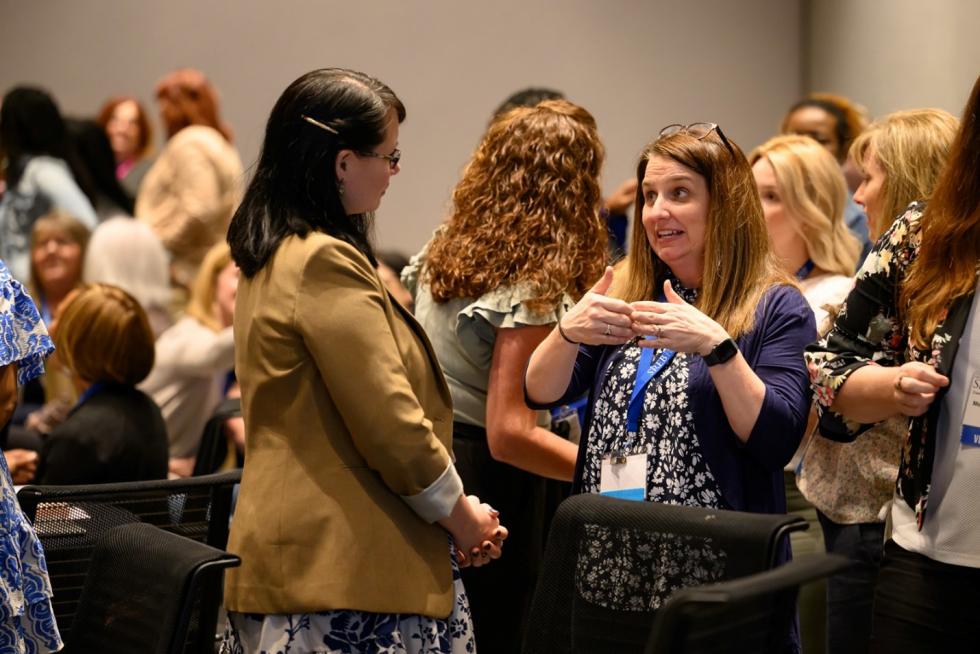 If I was better at sports
references, I’d have written this like a SportsCenter
commentary, filled with witty sporting word play. However, I’m
not, so I just ignored the obvious theme.
If I was better at sports
references, I’d have written this like a SportsCenter
commentary, filled with witty sporting word play. However, I’m
not, so I just ignored the obvious theme.
If you learned from these tips despite the fact that I didn’t use clever analogies to make it feel like you were watching an ESPN play-by-play, and you want to attend a conference that is filled with great coaching tips (and actually uses some of those clever sports terms), check out our website.

